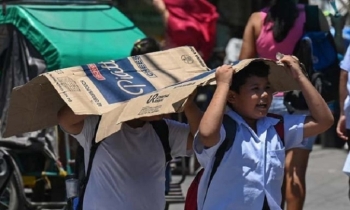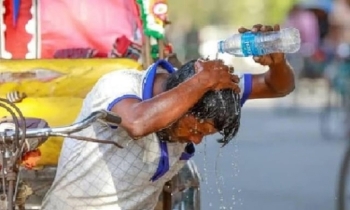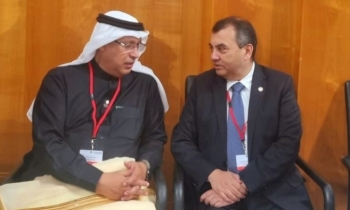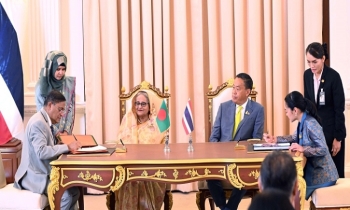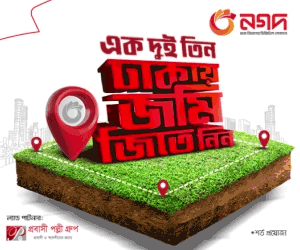Pahela Baishakh celebrated nationwide
BI Desk || BusinessInsider
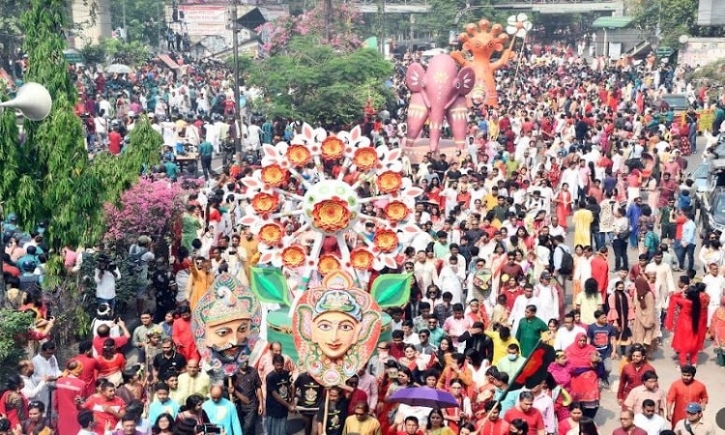
Photo: Collected
Pahela Baishakh, the first day of Bengali New Year 1431, was celebrated on Sunday across the country upholding the rich cultural values and rituals of the Bangalees.
It is one of the most colourful festivals through which the Bangalees bid farewell to the old year and welcome the New Year, reports BSS.
Likewise the previous years, the celebration of the first day of the Bangla calendar began at the traditional venue Ramna Batamul in the capital at the dawn with the musical soiree of Chhayanaut, a leading cultural organisation of the country.
Around 170 artistes including 80 singers participated in the event.
Eighteen singers performed solo songs as total 30 performances were in the event.
Later, traditional "Mangal Shobhajatra" (procession) under the arrangement of the Fine Arts Faculty of Dhaka University was brought out in the morning.
With the slogan "Amra To Timirbinashi", the Fine Arts Faculty celebrated Pahela Baishakh this year with a vow to removing darkness from society.
The colorful Mangal Shobhajatra was brought out from the Fine Arts Faculty premises around 9:15am with the participation of massive number of people wearing colorful dresses.
DU Vice-Chancellor Professor ASM Maksud Kamal inaugurated the procession while Social Welfare Minister Dr Dipu Moni, Dhaka North City Corporation Mayor Atiqul Islam, Prime Minister's Education and Cultural Affairs Adviser Dr. Kamal Abdul Naser Chowdhury, Dhaka Metropolitan Police (DMP) Commissioner Habibur Rahman, DU Pro-Vice Chancellor (Administration) Professor Dr Muhammad Samad, DU teachers, students, cultural personalities and a cross section of people joined it.
Large colourful masks, replicas of birds, various animal-shaped carnival floats, traditional dolls and other motifs of Bangladeshi culture that highlight the traditional folklore of Bangladesh were displayed in the procession.
Beginning from Fine Arts Faculty premises, the procession went around Shahbagh intersection, Dhaka Club premises and Teacher-Student Centre (TSC) intersection and ended at the Fine Arts Faculty premises around 9:45 am.
Since the morning, people started gathering on the Dhaka University campus to join the procession.
Jubilant participants of the procession welcomed the Bangla New Year with dancing and singing to the beating of traditional "dhak" and "dhol". Many people were seen enjoying the Mangal Shobhajatra standing both sides of the roads. Foreign nationals also joined the procession wearing traditional Bangalee dresses.
Bangladesh Television, Bangladesh Betar and private television channels broadcast the programmes of Ramna Batamul and Mangal Shobhajatra live.
Marking the festival, people from all walks of life wore traditional Bengali dresses. Young women wore white sarees with red borders and adorned themselves with bangles, flowers and "tips" while men wore white pyjamas and panjabis or kurtas.
Stringent security measures were taken on the Dhaka University campus, Ramna Park and surrounding areas marking the festival.
Mangal Shobhajatra were also brought out at divisional, district and upazila levels to reach the traditional programme to the grassroots as it has earned the international recognition.
Mangal Shobhajatra of the festival was first observed in 1989 under the initiative of the Fine Arts Faculty. It was inscribed on UNESCO's Representative List of Intangible Cultural Heritage of Humanity in 2016.
Business communities, especially in the rural areas, opened their traditional 'Halkhata', new account books. On the day, traders also offered sweets to customers.
Different cultural and social organizations also arranged various programme including cultural ceremony, exhibitions and quiz, essay and art competitions marking the festival.
Bangladesh Shilpakala Academy arranged various programme welcoming Bangla New Year on the academy premises. Liberation War trustee Mafidul Haque joined the programme as the chief discussant with Shilpakala Academy Secretary Salahuddin Ahammad in the chair.
The city people started the day with the traditional breakfast of 'panta bhat' (soaked rice), green chili, onion and fried fish at their residences as well as different amusement places including Ramna Park, Suhrawardy Uddyan and Rabindra Sarobor at Dhanmondi.
On the occasion, all museums and archaeological sites remain open for all while children, students, people with disabilities and autism are being allowed to visit the museums free of cost.
On the occasion, improved traditional foods were distributed to jail inmates, patients in hospitals and orphanages.
Marking the festival, capital's Manik Miah Avenue was painted with traditional "alpana" (designs).
Bangladesh missions abroad also celebrated Pahela Baishakh through various programmes to welcome the Bengali New Year.
The law enforcement agencies took extensive security measures across the country so that people could celebrate the day in peaceful manner.
The day was a public holiday.
Bangladesh Television, Bangladesh Betar and other private TV and radio channels are airing special programmes highlighting the significance of Pahela Baishakh.
Some historians attribute the Bengali calendar to the seventh century King Shashanka, which was later modified by Mughal Emperor Akbar for the purpose of tax collection.
During the Mughal rule, land taxes were collected from Bengali people according to the Islamic Hijri calendar. This calendar was a lunar calendar, and its new year did not coincide with the solar agricultural cycles.
Akbar asked the royal astronomer Fathullah Shirazi to create a new calendar by combining the lunar Islamic calendar and solar Hindu calendar already in use, and this was known as Fasholi shan (harvest calendar).


